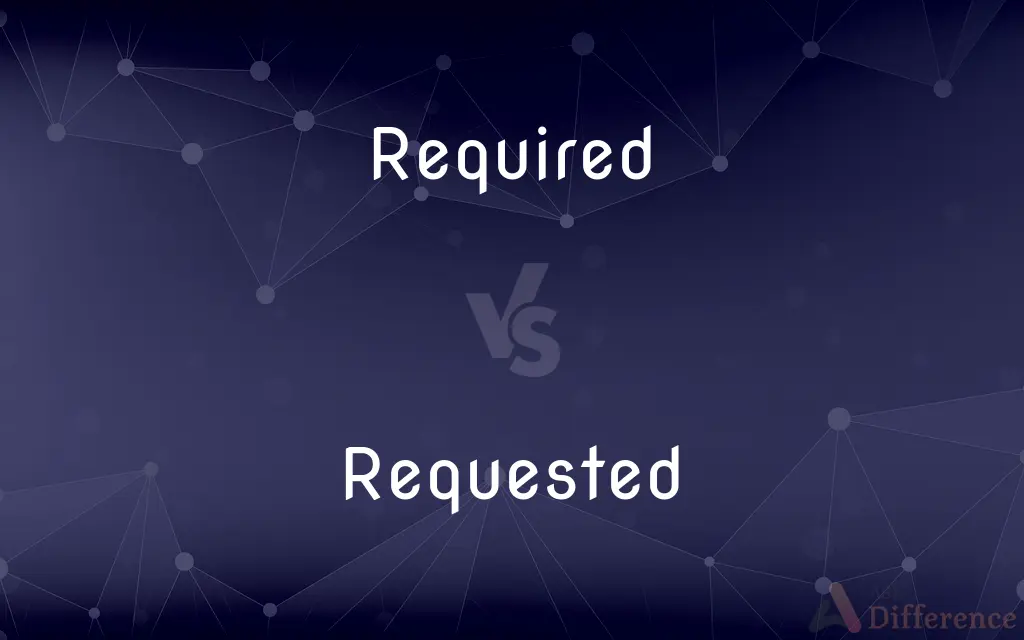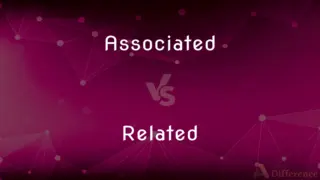Required vs. Requested — What's the Difference?
By Tayyaba Rehman & Fiza Rafique — Updated on April 28, 2024
Required implies a necessity or obligation, while requested suggests a preference or suggestion without mandatory compliance.

Difference Between Required and Requested
Table of Contents
ADVERTISEMENT
Key Differences
"Required" denotes something that is compulsory or mandatory. It sets a standard that must be met, often underpinned by rules, regulations, or laws. In contrast, "requested" implies something that is asked for politely or formally but does not carry the same level of obligation. It suggests a preference rather than a condition.
In many professional or academic settings, required tasks or items are non-negotiable and must be completed or included as specified. Meanwhile, requested elements are often open to negotiation or can be omitted without severe consequences, emphasizing their less imperative nature.
When something is required, failing to meet the requirement usually results in penalties or negative outcomes, such as legal repercussions or failing a course. On the other hand, not fulfilling a request might at most lead to disappointment or a need for adjustments, but not punitive measures.
Required often pertains to minimum standards or essential needs, ensuring safety, compliance, or basic functionality. For instance, wearing a helmet when riding a motorcycle is required for safety. Conversely, requested can be more about enhancing comfort, effectiveness, or personal preferences, like requesting a window seat on a flight.
Documentation processes frequently illustrate this difference; some documents are required for legal compliance, such as a passport for international travel. Alternatively, other documents might be requested to better support a service or process, like asking for references in a job application but not making them a strict requirement.
ADVERTISEMENT
Comparison Chart
Definition
Imposed as an obligatory condition
Asked for as a preference or suggestion
Consequence
Non-compliance results in penalties
Non-compliance has minimal consequences
Flexibility
No flexibility; must be adhered to
Flexible; subject to circumstances
Example Context
Safety regulations, legal requirements
Customer preferences, optional features
Nature of Demand
Compulsory and enforced
Non-compulsory and not enforced
Compare with Definitions
Required
Needed to achieve a specific result or standard.
Passing grades are required to graduate.
Requested
Asked for politely or formally.
He requested a day off next Friday.
Required
Mandatory or obligatory by law or rule.
Attendance is required at all major company meetings.
Requested
Sought after as a preference, not a demand.
Vegan options are requested at the event.
Required
Necessary as part of a process or condition.
A valid ID is required to enter the building.
Requested
Optional or at discretion.
Feedback is requested but not mandatory.
Required
Essential for functionality or operation.
Regular maintenance is required to keep the machine running smoothly.
Requested
Expressing desire or interest without insistence.
Assistance is requested for setting up the presentation.
Required
Imposed as a requisite.
Safety gear is required for all construction workers.
Requested
Invited or called for.
Contributions are requested for the office party fund.
Required
Needed; essential
Missing several required parts.
Requested
To express a desire for, especially politely; ask for. Often used with an infinitive or clause
Requested information about the experiment.
Requested to see the evidence firsthand.
Requested that the bus driver stop at the next corner.
Required
Obligatory
Required reading.
Requested
To ask (a person) to do something
The police requested her to accompany them.
Required
Simple past tense and past participle of require
Requested
An act of asking for something.
Required
Necessary; obligatory; mandatory.
Requested
Something asked for
Wasn't happy until he got his request.
Required
Necessary for relief or supply;
Provided them with all things needful
Requested
Simple past tense and past participle of request
Required
Required by rule;
In most schools physical education are compulsory
Attendance is mandatory
Required reading
Requested
Asked for;
The requested aid is forthcoming
Common Curiosities
What does "required" mean in legal documents?
In legal documents, "required" means something that is mandatory and must be complied with as per the law or contract.
Is it necessary to comply with all requested items in a job application?
While it's not necessary, complying with requested items in a job application can enhance your chances of being selected.
Is a requested item on a form as important as a required one?
A requested item on a form is less important than a required one because it does not carry the same consequences for non-compliance; however, providing requested information can still be beneficial for the processing or understanding of the form.
What is the primary difference between something being required and requested in a professional setting?
In a professional setting, something required is a must-do or must-have to comply with job duties, policies, or regulations, while requested items or actions are encouraged but optional and often depend on personal discretion or situational needs.
What legal implications are there for not meeting required standards?
Not meeting required standards can lead to legal implications such as fines, sanctions, revocation of licenses, or other penalties depending on the specific regulations or standards involved.
How do requirements affect product design?
Requirements are crucial in product design as they define the essential features, safety standards, and performance specifications that the product must meet, whereas requested features are typically additional enhancements that cater to user preferences.
Can a requested task become a required one?
Yes, a requested task can become required if it is later mandated by authority or changes in policy.
What happens if a required condition is not met?
Failing to meet a required condition can lead to penalties such as fines, denial of services, or other legal consequences.
How should one respond to a requested action at work?
One should consider a requested action seriously and try to fulfill it if possible, though it is not obligatory like a required action.
How should one prioritize required and requested tasks?
Required tasks should always be prioritized as they are essential for compliance or successful completion of responsibilities; requested tasks should be handled afterward, based on available time and resources.
In educational settings, how do required and requested readings differ?
Required readings are essential for course understanding and completion, directly impacting grades and academic performance, while requested readings are supplementary, aimed at broadening understanding or providing additional context.
Can ignoring requested tasks repeatedly affect workplace reputation?
Yes, consistently ignoring requested tasks can affect one's reputation in the workplace, as it may be perceived as uncooperative or indifferent to team needs or management preferences.
Why might an organization prefer to request rather than require certain actions from its employees?
An organization might prefer to request certain actions to provide flexibility, foster a more relaxed or innovative atmosphere, or to test new procedures before making them mandatory.
What role do required and requested items play in customer service?
In customer service, required items ensure compliance with service standards and legal obligations, while requested items enhance customer satisfaction and personalization of service.
Can a requirement be waived or changed to a request?
Yes, a requirement can be waived or changed to a request depending on changes in policy, circumstances, or upon negotiation, especially if the strict necessity for compliance is reassessed or deemed excessive.
Share Your Discovery

Previous Comparison
Ing vs. Ed
Next Comparison
Associated vs. RelatedAuthor Spotlight
Written by
Tayyaba RehmanTayyaba Rehman is a distinguished writer, currently serving as a primary contributor to askdifference.com. As a researcher in semantics and etymology, Tayyaba's passion for the complexity of languages and their distinctions has found a perfect home on the platform. Tayyaba delves into the intricacies of language, distinguishing between commonly confused words and phrases, thereby providing clarity for readers worldwide.
Co-written by
Fiza RafiqueFiza Rafique is a skilled content writer at AskDifference.com, where she meticulously refines and enhances written pieces. Drawing from her vast editorial expertise, Fiza ensures clarity, accuracy, and precision in every article. Passionate about language, she continually seeks to elevate the quality of content for readers worldwide.
















































